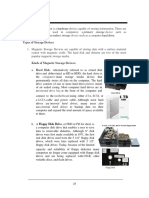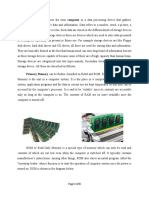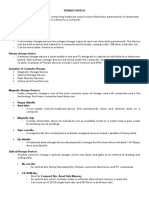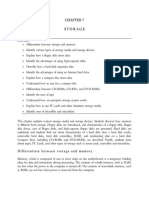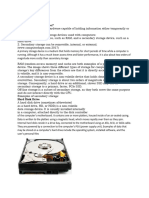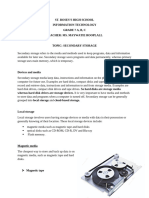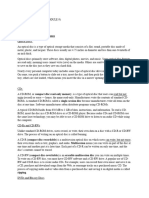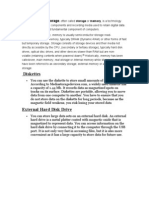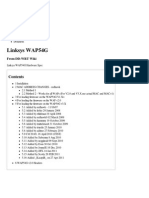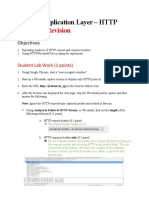Diskette A Floppy Disk
Diskette A Floppy Disk
Uploaded by
Christian ReomalesCopyright:
Available Formats
Diskette A Floppy Disk
Diskette A Floppy Disk
Uploaded by
Christian ReomalesOriginal Description:
Original Title
Copyright
Available Formats
Share this document
Did you find this document useful?
Is this content inappropriate?
Copyright:
Available Formats
Diskette A Floppy Disk
Diskette A Floppy Disk
Uploaded by
Christian ReomalesCopyright:
Available Formats
Diskette A floppy disk, also called a floppy, diskette or just disk, is a type of disk storage composed of a disk of thin
and flexible magnetic storage medium, sealed in a rectangular plastic carrier lined with fabric that removes dust
particles. Floppy disks are read and written by a floppy disk drive (FDD). Floppy disks, initially as 8-inch (200 mm)
media and later in 5-inch (133 mm) and 3-inch (90 mm) sizes, were a ubiquitous form of data storage and
exchange from the mid-1970s into the late 2000s.
https://en.wikipedia.org/wiki/Floppy_disk
http://www.duden.de/_media_/full/D/Diskette-201020080587.jpg
https://en.wikipedia.org/wiki/Floppy_disk#/media/File:Floppy_disk_2009_G1.jpg
-wag ka mag-reply hahaHard Disk
A hard disk is part of a unit, often called a "disk drive," "hard drive," or "hard disk drive," that stores and provides
relatively quick access to large amounts of data on an electromagnetically charged surface or set of surfaces. Today's
computers typically come with a hard disk that contains several billion bytes (gigabytes) of storage.
http://searchstorage.techtarget.com/definition/hard-disk
A hard disk drive (HDD), hard disk or hard drive, is something used by computers to store information. Hard disks use
magnetic recording (similar to the way recording is done on magnetic tapes) to store information on rotating circular
platters. The capacity of a hard drive is usually measured in gigabytes (GB), however hard disc capacity can also be
measured in terabytes when the capacity is over 1000 gigabytes.
https://simple.wikipedia.org/wiki/Hard_disk
http://www.kitguru.net/wp-content/uploads/2014/04/seagate_sshd_hybrid_hdd_1.jpg
CD-ROM
A CD-ROM /sidirm/ is a pre-pressed optical compact disc which contains data. The name is an acronym which
stands for "Compact Disc Read-Only Memory". Computers can read CD-ROMs, but cannot write to CD-ROMs which
are not writable or erasable.
https://en.wikipedia.org/wiki/CD-ROM
A Compact Disc (CD) is a type of optical disc. It is flat and round, and is used to store digital data. It was first used to
store music and other sounds (and is sometimes called an "audio CD"). The sound on a CD is played using a
compact disc player. It was developed by Philips and Sony.
https://simple.wikipedia.org/wiki/Compact_Disc
http://1.bp.blogspot.com/-_kAr4lYRuMQ/TXiavDHKEDI/AAAAAAAAAC4/sn2ILERCDtk/s1600/cdr.jpg
Flash Disk
A USB flash drive, also commonly known as a USB drive, USB stick and a variety of other names,[a] is a data storage
device that includes flash memory with an integrated USB interface. USB flash drives are typically removable and
rewritable, and physically much smaller than an optical disc.
https://en.wikipedia.org/wiki/USB_flash_drive
USB, short for Universal Serial Bus, is an industry standard developed in the mid-1990s that defines the cables,
connectors and communications protocols used in a bus for connection, communication, and power supply between
computers and electronic devices.[4] It is currently developed by the USB Implementers Forum (USB IF).
https://en.wikipedia.org/wiki/USB
http://www.brite-mat.co.ke/wp-content/uploads/2012/08/FlashDisk.jpg
Ten Commandments of Computer Ethics
Created by the Computer Ethics Institute
(Please Cite the Computer Ethics Institute if you quote us)
1. Thou Shalt Not Use A Computer To Harm Other People.
2. Thou Shalt Not Interfere With Other Peoples Computer Work.
3. Thou Shalt Not Snoop Around In Other Peoples Computer Files.
4. Thou Shalt Not Use A Computer To Steal.
5. Thou Shalt Not Use A Computer To Bear False Witness.
6. Thou Shalt Not Copy Or Use Proprietary Software For Which You have Not Paid.
7. Thou Shalt Not Use Other Peoples Computer Resources Without Authorization Or Proper Compensation.
8. Thou Shalt Not Appropriate Other Peoples Intellectual Output.
9. Thou Shalt Think About The Social Consequences Of The Program You Are Writing Or The System You Are
Designing.
10. Thou Shalt Always Use A Computer In Ways That Insure Consideration And Respect For Your Fellow Humans.
See the Ten Commandments of Computer Ethics in PDF
The Ten Commandments of Computer Ethics were first presented in Dr. Ramon C. Barquin's paper, "In Pursuit of a
'Ten Commandments' for Computer Ethics."
http://computerethicsinstitute.org/publications/tencommandments.html
You might also like
- AOMEI® Partition Assistant User ManualDocument66 pagesAOMEI® Partition Assistant User ManualDred Ched0% (1)
- Designing of Storage SystemsDocument8 pagesDesigning of Storage SystemsJin KazamaNo ratings yet
- Storage Devices and Its UsesDocument4 pagesStorage Devices and Its UsesSanjay SinghNo ratings yet
- E Storage DeviceDocument8 pagesE Storage DevicePanopio EnterpNo ratings yet
- External Storage DDocument4 pagesExternal Storage DAkash SagarNo ratings yet
- Dokumen Dari Firda Auliya SDocument3 pagesDokumen Dari Firda Auliya SFirda AuliaNo ratings yet
- Secondary StorageDocument7 pagesSecondary StorageAlma MaryNo ratings yet
- Pert.6 - StorageDocument20 pagesPert.6 - StorageMarketing StaffNo ratings yet
- Storage DevicesDocument32 pagesStorage Devicesdairyl.virreyNo ratings yet
- Flash Drive Fact SheetDocument2 pagesFlash Drive Fact SheetThe UserNo ratings yet
- Chapter EightDocument27 pagesChapter EightMohamed FarahNo ratings yet
- Select Appropriate Media To Backup and Restore DataDocument22 pagesSelect Appropriate Media To Backup and Restore DataJabari VialvaNo ratings yet
- Optical Disk and Read-Only Disk EquipmentDocument24 pagesOptical Disk and Read-Only Disk EquipmentRean Joy CalalangNo ratings yet
- Product Life Cycle (PLC) : Floppy DiskDocument4 pagesProduct Life Cycle (PLC) : Floppy DiskSajid100% (1)
- Blue Ray DiskDocument6 pagesBlue Ray DiskManpreet SachdevaNo ratings yet
- ComputerDocument3 pagesComputerMikaela RamosNo ratings yet
- Computer Storage DevicesDocument6 pagesComputer Storage Devicesgabriel chinechendu100% (1)
- Storage DevicesDocument3 pagesStorage DevicesAko-ang Batang Ekis100% (1)
- Identifying Purposes and Characteristics of Storage DevicesDocument81 pagesIdentifying Purposes and Characteristics of Storage DevicesebsenbabaNo ratings yet
- Chapter 7 StorageDocument10 pagesChapter 7 StorageAminiasi SalatovouNo ratings yet
- Storage Devices Are Any Type of Hardware That Is Capable of Storing andDocument2 pagesStorage Devices Are Any Type of Hardware That Is Capable of Storing andPrasanna KumarNo ratings yet
- Application Software - Lesson 3Document38 pagesApplication Software - Lesson 3Nisan SfumatoNo ratings yet
- Secondary StorageDocument15 pagesSecondary StorageKyle CaguladaNo ratings yet
- Group 2Document4 pagesGroup 2joy diagbelNo ratings yet
- Itcs Lec8 - Hardware StorageDocument42 pagesItcs Lec8 - Hardware StorageJulius S. MartinezNo ratings yet
- Storage DevicesDocument25 pagesStorage DevicesBerlin AlcaydeNo ratings yet
- Floppy Disk - WikipediaDocument123 pagesFloppy Disk - Wikipediayannaungsoe890No ratings yet
- Information Technology: Topic: Secondary Storage Device Teacher: Miss Group Name: Tech Army DUE DATE: 10/19/2020Document9 pagesInformation Technology: Topic: Secondary Storage Device Teacher: Miss Group Name: Tech Army DUE DATE: 10/19/2020Maduri JaikaranNo ratings yet
- Methods of Data StorageDocument2 pagesMethods of Data StorageGugathasan Dharsan100% (1)
- Lesson 7 (Secondary Storage)Document5 pagesLesson 7 (Secondary Storage)siepiner72No ratings yet
- Study Module 2Document17 pagesStudy Module 2canal abdulNo ratings yet
- Ict 1Document15 pagesIct 1Noor AliNo ratings yet
- What Is Data Storage For Cambridge IGCSE ICTDocument15 pagesWhat Is Data Storage For Cambridge IGCSE ICTpriyatharshan_viswa100% (1)
- Lab Manual 1Document45 pagesLab Manual 1Tushar SahuNo ratings yet
- What Is A Floppy Disk DriveDocument3 pagesWhat Is A Floppy Disk DriveZachary WadeNo ratings yet
- Topic: Secondary Memory: Presented By: Presented ToDocument26 pagesTopic: Secondary Memory: Presented By: Presented ToAnurag SanjayNo ratings yet
- Biometric DevicesDocument8 pagesBiometric DevicesraynerngureNo ratings yet
- DRAFT NARRATIVE - IT TOOLS REPORTING Module 9Document4 pagesDRAFT NARRATIVE - IT TOOLS REPORTING Module 9frenzuaavellanoza1222No ratings yet
- Chapter 7: StorageDocument9 pagesChapter 7: StorageSapna KawatNo ratings yet
- Lecutre 6 Storage-DevicesDocument28 pagesLecutre 6 Storage-Devicesarsalan.softwaresNo ratings yet
- Unit 3 - Hardware - Storage DevicesDocument20 pagesUnit 3 - Hardware - Storage DevicesLan HoangNo ratings yet
- Section 3 Storage Devices and MediaDocument6 pagesSection 3 Storage Devices and Mediaiqrakhan.avicennaNo ratings yet
- 7 TLE CSS 9 Module 3.5 Storage DevicesDocument28 pages7 TLE CSS 9 Module 3.5 Storage Devicesjohnmatthewavancena584No ratings yet
- Itm AssignmentDocument3 pagesItm AssignmentAmartya VikramNo ratings yet
- AnuDocument7 pagesAnuanuragshindhe5573No ratings yet
- AnswerDocument7 pagesAnswerXuan MoMoNo ratings yet
- Storage Devices: Powerpoint Presentation OnDocument27 pagesStorage Devices: Powerpoint Presentation Onmikesam50% (2)
- Experiment:5 Aim:: 1. Floppy Disk DriveDocument5 pagesExperiment:5 Aim:: 1. Floppy Disk DriveArvindNo ratings yet
- Introduction of Secondary MemoryDocument5 pagesIntroduction of Secondary MemorykhurramNo ratings yet
- Exhibition Write UpDocument2 pagesExhibition Write UpAKSHAYNo ratings yet
- Introduction To Information TechnologyDocument4 pagesIntroduction To Information TechnologyPolicar MicheloNo ratings yet
- USB MemoryDocument2 pagesUSB MemoryLorea Pérez GarrigósNo ratings yet
- Data StorageDocument14 pagesData Storageapi-327731606No ratings yet
- Lesson 4 Computer Hardware PartsDocument30 pagesLesson 4 Computer Hardware PartsBrayden ReyesNo ratings yet
- Evolution of The Major Computer Storage Devices: Gamze ZeytinciDocument34 pagesEvolution of The Major Computer Storage Devices: Gamze ZeytinciVarun DhuriaNo ratings yet
- Data Storage: Internal Storage/Main Storage/Primary StorageDocument7 pagesData Storage: Internal Storage/Main Storage/Primary StorageL NNo ratings yet
- Cals PDFDocument3 pagesCals PDFsamNo ratings yet
- Unit - 4 PCDocument7 pagesUnit - 4 PCnanobala15No ratings yet
- Ict Report: Storage DevicesDocument22 pagesIct Report: Storage DevicesKristine Joy BrionesNo ratings yet
- Beginner's Guide for Cybercrime InvestigatorsFrom EverandBeginner's Guide for Cybercrime InvestigatorsRating: 5 out of 5 stars5/5 (1)
- USB Mass Storage: Designing and Programming Devices and Embedded HostsFrom EverandUSB Mass Storage: Designing and Programming Devices and Embedded HostsNo ratings yet
- Reomales, Ericka Mhae T. 10 - Palma Sir Carlo GutierrezDocument3 pagesReomales, Ericka Mhae T. 10 - Palma Sir Carlo GutierrezChristian ReomalesNo ratings yet
- ALTER EGO A1 SolutionsDocument1 pageALTER EGO A1 SolutionsChristian ReomalesNo ratings yet
- B1A4 Is A South Korean Boy Group Formed By: WM Entertainment Webtoon EPDocument2 pagesB1A4 Is A South Korean Boy Group Formed By: WM Entertainment Webtoon EPChristian ReomalesNo ratings yet
- Archaeo 2 Midterms ReviewerDocument4 pagesArchaeo 2 Midterms ReviewerChristian ReomalesNo ratings yet
- Trig Cheat SheetDocument4 pagesTrig Cheat Sheetapi-284574585No ratings yet
- H a r i (하 리) - C u t i e S o n g (귀 요 미 송)Document1 pageH a r i (하 리) - C u t i e S o n g (귀 요 미 송)Christian ReomalesNo ratings yet
- Food in Ancient Greece 3Document10 pagesFood in Ancient Greece 3Christian ReomalesNo ratings yet
- One ShotDocument1 pageOne ShotChristian ReomalesNo ratings yet
- Study of Mathematical Operations Performed On Certain Variables That Can Have Only Two Values: True or FalseDocument8 pagesStudy of Mathematical Operations Performed On Certain Variables That Can Have Only Two Values: True or FalseChristian ReomalesNo ratings yet
- Advanced Math Learning AidsDocument1 pageAdvanced Math Learning AidsChristian ReomalesNo ratings yet
- Delphi 3 Installation Notes Important: Before InstallingDocument3 pagesDelphi 3 Installation Notes Important: Before InstallinggreatemailNo ratings yet
- SerialxpDocument3 pagesSerialxpreisstyleNo ratings yet
- Litra Master Plan: Details of Plan and MissionsDocument1 pageLitra Master Plan: Details of Plan and MissionsellonndlovuNo ratings yet
- VSAM - PatniDocument75 pagesVSAM - PatnimukeshNo ratings yet
- Question Bank For Computer For Digital EraDocument49 pagesQuestion Bank For Computer For Digital ErapreethiNo ratings yet
- Assembly Language Fundamentals: CMPS293&290 Class Notes (Chap 03) Kuo-Pao Yang Page 1 / 22Document22 pagesAssembly Language Fundamentals: CMPS293&290 Class Notes (Chap 03) Kuo-Pao Yang Page 1 / 22muhammad atiqNo ratings yet
- Project Report On Pick and Place RobotDocument20 pagesProject Report On Pick and Place RobotRanvijaySharma0% (2)
- Yealink Meeting Server Administrator Guide V25.0.0.10Document244 pagesYealink Meeting Server Administrator Guide V25.0.0.10Enrique CaleroNo ratings yet
- Chapter 01 ExercicesDocument5 pagesChapter 01 ExercicesYassine BlaliNo ratings yet
- Cpe 203Document18 pagesCpe 203Aanuoluwapo OluwasegunNo ratings yet
- Solution Assembly 8086Document20 pagesSolution Assembly 8086elil_1267% (6)
- L10 Lecture MemoryDocument21 pagesL10 Lecture MemoryTerence YapNo ratings yet
- Follow The "Installing Kubernetes On Linux With Kubeadm" Guide On The Catalyst CloudDocument8 pagesFollow The "Installing Kubernetes On Linux With Kubeadm" Guide On The Catalyst Cloudbharath_mv7-1No ratings yet
- Implementation of Shipment Handling Using Mainframe: Ajinkya PindawalaDocument3 pagesImplementation of Shipment Handling Using Mainframe: Ajinkya PindawalaAJINKYA PINDAWALANo ratings yet
- R8C/26, R8C/27: Group Group Hardware ManualDocument485 pagesR8C/26, R8C/27: Group Group Hardware ManualChung Tbyt Da NangNo ratings yet
- Fortran ResourcesDocument59 pagesFortran Resourcesrosvim100% (3)
- Linksys Wap54g - DD-WRT WikiDocument11 pagesLinksys Wap54g - DD-WRT WikiAndreas RudiyantoNo ratings yet
- Week 5: Application Layer - HTTP Protocol - : RevisionDocument11 pagesWeek 5: Application Layer - HTTP Protocol - : RevisionH.K.No ratings yet
- S3000ah ProdbriefDocument2 pagesS3000ah ProdbrieftechraptorNo ratings yet
- How To Install Ansys 14Document1 pageHow To Install Ansys 14Edwin Okoampa BoaduNo ratings yet
- Zxa10 C320Document3 pagesZxa10 C320khev1No ratings yet
- Introduction To Information and Communication TechnologyDocument19 pagesIntroduction To Information and Communication TechnologyHammad khanNo ratings yet
- PSP - Routing Instructions - TT3000SSA - Rev.2Document7 pagesPSP - Routing Instructions - TT3000SSA - Rev.2Ashish NayyarNo ratings yet
- E60 PLC Development Software Manual (MELSEC) BNP-B2347A (ENG)Document89 pagesE60 PLC Development Software Manual (MELSEC) BNP-B2347A (ENG)myoppok8No ratings yet
- 21-Problems On Memory Design-28!02!2024Document38 pages21-Problems On Memory Design-28!02!2024suhas kodakandlaNo ratings yet
- E4C Administration and Monitoring GuideDocument48 pagesE4C Administration and Monitoring GuideAlexis BenarrochNo ratings yet
- Portfolio-Practical Tasks - OnlineDocument15 pagesPortfolio-Practical Tasks - Onlinenrneitgi4tNo ratings yet
- Database Mirroring On SQL Server - OdtDocument15 pagesDatabase Mirroring On SQL Server - OdtSorinNo ratings yet
- Anr 7.2.9 (70296208) 20200429 172136Document10 pagesAnr 7.2.9 (70296208) 20200429 172136Beenzu Briella SiamalubeNo ratings yet



